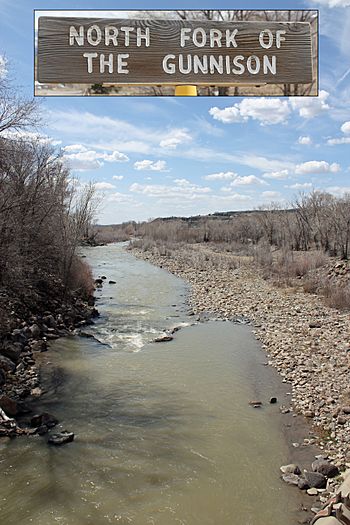North Fork Gunnison River facts for kids
The North Fork Gunnison River is a cool river in southwestern Colorado, United States. It's often called the "North Fork" by people who live nearby. This river is like a smaller stream that flows into a bigger one, the Gunnison River. It's about 33.5 miles (54 km) long. The North Fork helps drain water from the southwestern part of the Elk Mountains.
Quick facts for kids North Fork Gunnison River |
|
|---|---|

The river near Paonia, Colorado.
|
|
| Country | United States |
| State | Colorado |
| Physical characteristics | |
| Main source | Rocky Mountains 6,470 ft (1,970 m) 38°56′35″N 107°21′8″W / 38.94306°N 107.35222°W |
| River mouth | Gunnison River 5,096 ft (1,553 m) 38°46′58″N 107°50′12″W / 38.78278°N 107.83667°W |
| Basin features | |
| Basin size | 741 sq mi (1,920 km2) |
Contents
Where Does the North Fork Gunnison River Start?
The North Fork Gunnison River begins high up in the mountains. It's in the northwestern part of Gunnison County. The river forms when two smaller streams, called Muddy Creek and Anthracite Creek, join together.
The River's Journey
This meeting point is along Highway 133, near McClure Pass. From there, the river flows southwest through a valley that gets wider and wider. It passes by several towns like Somerset, Paonia, and Hotchkiss.
Where It Joins the Gunnison River
Finally, the North Fork joins the main Gunnison River in eastern Delta County. This happens downstream from the famous Black Canyon. The spot where they meet is between the towns of Delta and Hotchkiss.
Life in the North Fork Valley
The valley where the North Fork Gunnison River flows is known as the North Fork Valley. It has a nice, mild climate. This climate has made it a great place for growing fruit for a long time.
What Else is in the Valley?
The valley is also an important area for coal mining. The town of Somerset, located in the upper part of the valley, is a center for this industry. You can often see the signs of modern coal mining operations along the valley walls.
Water Quality and Sediment
The smaller streams that feed the river start in areas with soft ground. This ground can easily wash away. Because of this, the river often carries a lot of dirt and mud, especially when snow melts in the spring.
 | May Edward Chinn |
 | Rebecca Cole |
 | Alexa Canady |
 | Dorothy Lavinia Brown |

